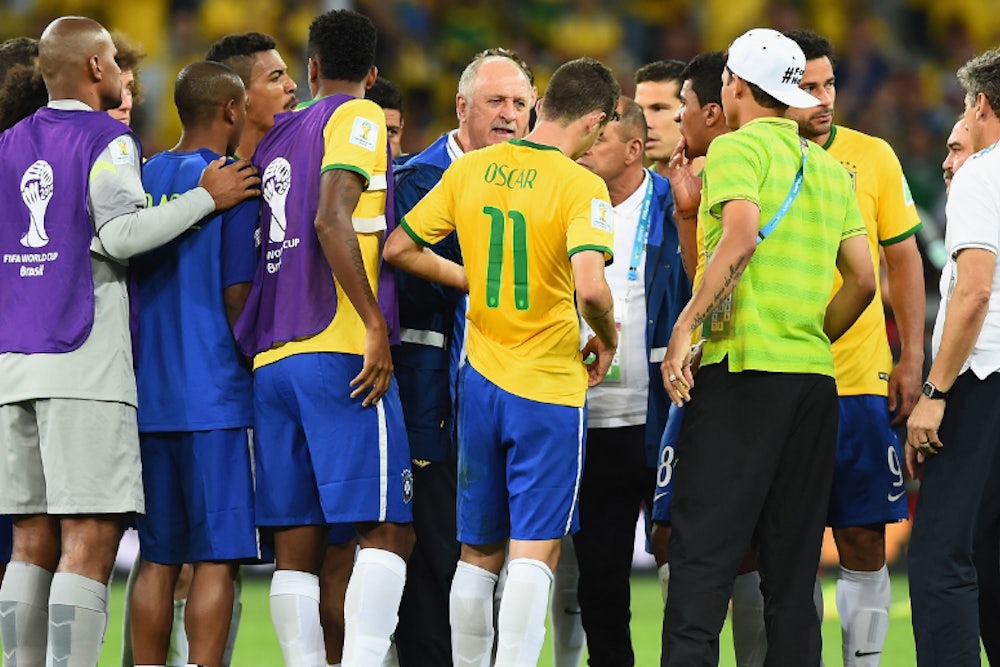When Brazil lost a relative squeaker to France in the finals of the 1998 World Cup, the country’s congress held intensive investigations and hauled some of its most storied athletes before a panel of preening politicians. Conspiracy theories swirled that cast blame in all directions—one widely held notion attributed the defeat to the machinations of Nike. The questions were irrational but give some hint of the mindset of a defeated Brazil and foreshadow the ugly recriminations that will follow this ugly defeat.
Part of the irrationality in 1998 was the very nature of the inquiry: Most countries would be perfectly happy to appear in the World Cup Finals—and, further, they would accept that a host country (France) has an outsized chance at prevailing in such a contest. The post-mortem spectacle of 1998, on some level, was amusing. But the scale of this defeat, the utter humiliation suffered today, demands genuine explanation.
There’s a conventional school of thought that places blame on the ideology of Brazilian football itself. According to this argument, the irresistibly likable paradigm of jogo bonito gave way to a more brutish style of play. In its rush to win more trophies, the country stopped producing transcendent talents like Pele and Ronaldo; it began fielding effective goons like Fernandinho and Hulk. As Brazil lost its capacity for manufacturing creative players, it squandered its comparative advantage.
Of course, it’s true that Brazilians are mad for the victory. Way back in the 1990s utilitarianism began to dominate the strategic thinking of the national team as it attempted to replicate the increasingly distant success of 1970. This shift was disguised by the occasional appearance of geniuses like Ronaldinho and Neymar. The overheated will to win, therefore, is a plausible explanation. But the Brazilian game is far more broken than that.
For starters, it is riddled with corruption—a corruption that has historically haunted the national federation and extended through coaches, agents, and even journalists. You could see hints of that corruption in the ridiculous manner in which this World Cup was conceived, where cronies of club owners built palatial stadiums with an eye towards kickbacks and future profits. But how does this corruption affect the quality of the Brazilian team? By siphoning money away from important investments—in youth development, in training facilities, in stable organizations capable of nurturing talent. Instead, many of the most promising young Brazilian players are sold prematurely by shady middlemen to European squads and doomed to early and avoidable failure in their careers.
European club soccer has another debilitating effect on the Brazilian system. When those young Brazilian players are sold to the big sides in Europe, they adapt themselves to becoming disciplined specialists in big organizations—outstanding wingbacks, skilled defensive midfielders. Of course, this is also true of Germans, Spaniards, and Italians. But the immersion of Brazilian prospects in the European game has also, to some unquantifiable extent, transformed the DNA of the Brazilian game, sapping the squad of its essential identity and squelching the creativity that has characterized its best teams.
Finally, there’s the way in which Luiz Scolari conceived this year's World Cup roster. It was built to be a defensive-minded machine, in the hard-minded style that he has always preferred as coach. Scolari favors players who are pliant, who uncomplainingly fit within his unit. He likes to think of his teams as families with himself positioned as the stern but loving father. So he installed mediocre journeyman like Hulk and Fred in central roles, even though they weren’t the most talented men available. Sound organization is sufficient for beating lesser teams, but the talent deficit of the squad Scolari assembled was ultimately always going to be exposed.
There’s tremendous pressure that comes with playing for Brazil—the game is inextricably tied to the national sense of self-worth more than in any other country on the planet. This pressure can be highly motivating, or terribly debilitating. From the first match of this tournament, when Marcelo shanked a ball past Julio Cesar, fear was palpable on the faces of this squad. Over the course of this tournament it frequently manifested itself in a profusion of tears.
Perhaps Scolari could have averted this catastrophe. He could have remade his lineup to better compensate for the loss of Neymar. Or he could have made bold substitutions after the second German goal, a dramatic change that would have throttled his team awake. But his squad’s biggest vulnerability was its fear of failure—and that was something that he helped instill in them from the start.
